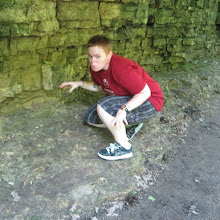9. The "far-out" uncle or grandmother who is really just a vessel for the author's own political bias/racism/sexism/religious fervor. I like to say that I am all of my characters and I am none of my characters, but with this pet-peeve we have a clearly overstepped boundary line that is usually quite glaring. I'm sure there are many examples, but the only one I can think of right now is from the book Wit's End which I recently read for class. The godmother is preoccupied with liberal-leaning politics that just scream, "This is what I, Karen Joy Fowler, really think about the American government!" And when said author came to speak to the class, she totes admitted this. Alls I am saying is, try to let your ideas come out in the story, not through some preachy character.
10. Skinny bitches. Praise different body types, people! Especially if your story is set within a culture whose ideals of attractiveness are different from your own. Pay attention. It's called Realism. (....maybe?)
11. Heroic males. It's just played out.
12. Books without chapters. Now, I know this is a small structural thing, but I really admire chapter breaks. The point of them is to break up what you're reading and give you a chance to breathe, in the same vein of a period or paragraph break. They can also serve to break up the time-line of your story, or switch perspectives. Longer stories can certainly work without chapter breaks, but for me, it's a detriment to ignore them.
13. Overuse of internal monologue. "At the circus, I couldn't stop looking at Brian. Was he looking at me when I wasn't looking at him? Did he want me to look at him? Should I go over and say hi? If I went over and said hi the worst thing he could do is ignore me, I suppose. Or, well, the worst thing he could do would be to spit in my face and call me a cow and pants me before taking a picture as I cry and then run away and elope with my mom. But I don't think that would happen. Would it?" Versus, "I ran into Brian at the circus and I couldn't stop looking at him. Finally, I decided to say hello."
14. Single paragraphs that span entire pages. Again, it's a breathing issue. I open a book to a page and it's covered in text, I get overwhelmed and turned off from any desire I had of reading it. White space on the page is psychological oxygen for the reader; don't choke it all out!
15. Demonstrative dialect. "Didja wa' 'im ta put ou' da ca' now, Missa Rod'rick?" Just distracting.
16. Lack of quotation marks to denote speech. Lack of paragraph breaks or dialogue tags could also be added here. I'm not saying there isn't a way to make this work, but I haven't seen it yet. I (and many others) grew up learning to read a certain way, and so rather than being a stylistic choice or a narrative choice or whathaveyou, doing away with quotation marks is just messing with the signifiers I've been conditioned to look for. It gets frustrating.
17. Assholes we're supposed to like. Especially if also the female lead who hates the douche eventually ends up with him. I'm looking at you, every romance novel ever (not to mention innumerable crime novels as well).
18. Rhetorical questions. This is pretty much in tandem with overuse of internal monologue. Jodi Picoult, this means you.


No comments:
Post a Comment